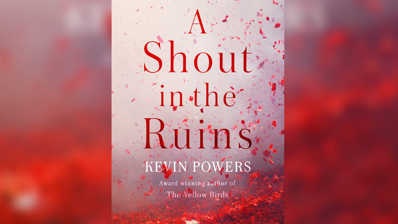Stephanie Jones Book Review: A Shout In The Ruins
- Publish date
- Monday, 28 May 2018, 9:03AM

American civility is on the decline, and perhaps this fact has inspired some of the great surveyors of the national condition to revisit the dark side of the Dream, the Civil War. Charles Frazier’s new novel, Varina, revisits the life of the wife of Confederate leader Jefferson Davis, and now comes A Shout in the Ruins, an historical novel set in author Kevin Powers’s hometown of Richmond, Virginia, where the fantasy of southern secession at last flamed out.
An Iraq veteran, Powers came to notice for his war novel The Yellow Birds, and with A Shout in the Ruins he goes deeper into National Book Award territory. The narrative spins loosely around two axes: the end of slavery, and the remnants of the Civil War in the 20th century.
In the spring of 1861, Emily Reid is a young teenager, the daughter of a mule skinner. Like all families of some means, hers owns slaves; Aurelia and her son Rawls, whose toes were docked by his previous owner to curb his propensity to run away. Rawls takes charge of the freight transported by Bob Reid’s mules, his performance in the role giving him a measure of protection in his value to the local economy. Neither resigned nor bold, “it occurred to him that there were few things he was truly afraid of anymore.”
No novel that touches on the peculiar institution lacks a villain, and Powers’s is Antony Levallois, a not atypical example of his species – an unmarried Virginian landowner who has never slept with a white woman and, when he bothers to ponder slavery, “[takes] it on faith that the state of things was an expression of God’s will.” He tells his slaves, using the terminology of the day, that he might as well be God: “You cannot even die unless I allow it.” He is cruel but correct. He is nearly 40 when he takes Emily Reid as his wife.
In 1950s Richmond, George Seldom is in his 90s, his remarkable story having begun when he was plucked as a baby from beneath his dead mother’s skirts near a battleground. The “Injun bandit” Seldom brothers who found him wrapped him in a Confederate colonel’s blanket and handed him over to an adoptive mother along with their name, then succumbed to rough justice.
These examples are instructive: almost every relationship in the novel, up to and including the doomed love of Vietnam vet Billy Rivers and Lottie Bride in the 1980s, takes place inside a crater left by one war or another.
Powers isn’t derivative, but there is something awfully Hemingwayesque about his writing, in both subject and style. He observes without sentimentality the failings of humanity, recording them in unshowy declarative sentences, building to an inarguable conclusion about “the truth at the heart of every story, that violence is an original form of intimacy, and always has been, and will remain so forever.”
Each of Powers’s books has felt like a masterpiece upon its arrival – he is a trenchant philosopher of race, class and history, and his writing is composed, authoritative, infused with certainty – but he must have much more to say, and his best work surely lies ahead of him. For now, A Shout in the Ruins is a well-timed reminder that the ripple effects of battle are felt on and on down the years.
To be in to win a copy of A Shout In The Ruins click here.
Every week Stephanie reviews the Book of the Week.
As the Coast book reviewer, Stephanie Jones shares her thoughts each week on the latest releases.
Stephanie has a BA (Hons) in history and English literature, and a background in journalism, magazine publishing, public relations and corporate and consumer communications.
Stephanie is a contributor to the New Zealand Book Council’s ‘Talking Books’ podcast series (listen here), and a member of the 2016 Ngaio Marsh Award judging panel. She can be found on Twitter @ParsingThePage.

Take your Radio, Podcasts and Music with you

